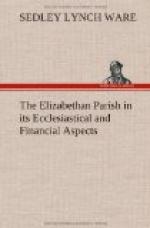Ecclesiastical courts sometimes condemned offenders to pay a fine for the use of the poor.[296] Sometimes they commuted a penance for money to go to church-repair or to the parish poor.[297] The churchwardens or overseers of the poor accounts also mention fines received for profanation of the Sabbath and for offences during service time.[298] The Star Chamber often condemned offenders, especially enclosers of cottage land and engrossers of corn, to fines for the benefit of the poor.[299] Finally, most parishes derived some income from fining men various sums for refusing parish offices; for neglect of duty when in office; and for not attending duly called vestry meetings. Sometimes a parishioner would pay down a large lump sum for exemption forever from all offices served by the parishioners.[300]
Yet another irregular but appreciable means of revenue might be classed under the heading of Miscellaneous Receipts.
As the parishioners were always eager to turn an honest penny for their own benefit, no possible source of receipts was neglected. If, for instance, any part of the church or the church premises might, temporarily or permanently, be rented out without drawing upon the community the censure of the ordinary, the parishioners were happy to do so. Owners of structures of any kind encroaching upon the churchyard, or other church land, were promptly made to pay for the privilege.[301] Occasionally parishes derived more or less large sums from the sale of parish valuables. The sale of costly vestments, embroideries, hangings, images, chalices, pyxes and other church furnishings and ornaments condemned as superstitious by the Anglican church, brought some income to the wardens of most parishes during the first years of Elizabeth. Examples will be found in all the accounts. Now and then, too, a parish would make a large sum from the sale of the wood or other products of parish lands.[302] A fairly common item in city parishes especially were fees paid for licences to eat flesh during Lent and on other legal fast days.[303]
When an Elizabethan parish undertook some work on a great scale, such as the rebuilding of its church, or of the church steeple; or, again, when it had suffered great losses by fire or flood, it solicited through Begging Proctors the Contributions of Outsiders, sometimes from all parts of England.[304]
To terminate our enumeration of means of raising money, or of contributions of all sorts on which the wardens could count (as apart from rates, properly so-called), we might mention Fixed Contributions, of money or of labor, issuing out of certain tenements; and Annual Payments to Mother Churches. Certain lands or houses, generally abutting on the church grounds, had fixed upon them the obligation to repair a certain portion of the churchyard enclosure, Tenement X, so many feet of fence, Tenement Y, such a portion of brick or stone wall, and so forth.[305]




